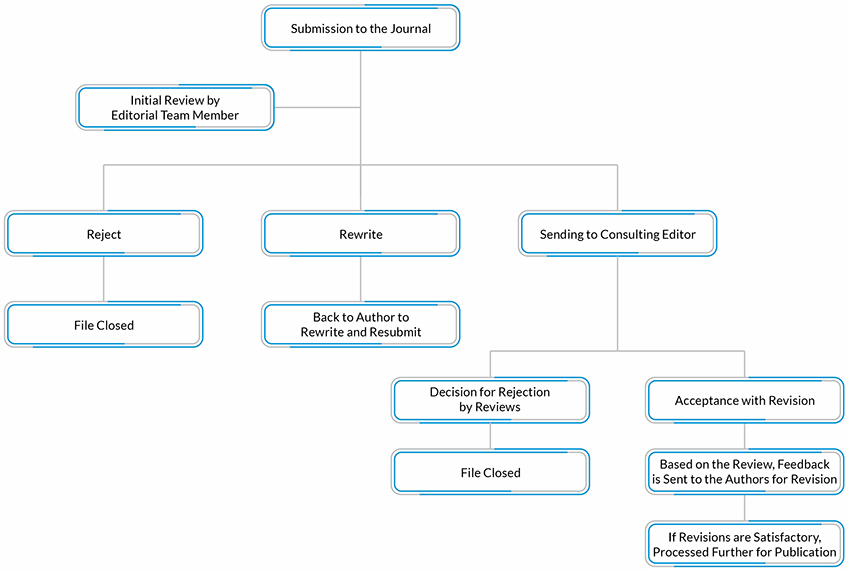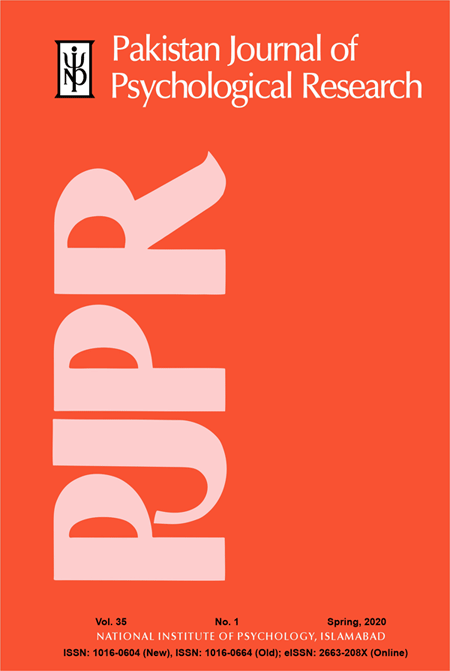Peer Review Process and Policy
Pakistan Journal of Psychological Research follows & recommends the American Psychological Association (APA Manual 7th Edition) Recommendations for the Conduct, Reporting, Editing, and Publication of Scholarly Work in our Journal and the Principles of Transparency and Best Practice in Scholarly Publishing (joint statement by COPE , DOAJ , WAME , and OASPA ).
The peer-review process ensures that only high-quality content will get published in the journal. All the new submissions will undergo Initial screening and then a peer-review process before publication to maintain the content quality.
We aim to provide professional, fair, timely, and confidential peer reviews by the field experts. The review consists of the following steps:
Initial Screening
Once a paper is submitted, the Executive Managing Editor (EME) will screen the manuscript and decides whether or not to send it for full peer-review. This step is to ensure adherence to our policies, including statements of competing interests, ethical requirements for studies involving human participants or animals, as well as the unacceptably low standard language. For example, the editor makes sure:
- Does the manuscript fit the journal's scope, and will it be of interest to the readership?
- Is the manuscript of acceptable quality?
- Is the writing good enough to make it worth reviewing?
- Is the manuscript compliant with the journal's instructions for authors?
In case the editor suggests some changes in the manuscript before full peer-review during the initial evaluation, the author(s) may be asked for a revision.
If the submitted manuscript is inconsistent with our Editorial Guidelines, the manuscript may be rejected without a full peer-review.
Only the manuscripts surviving the initial screening will be sent for peer-review.
Peer Review Process
All manuscripts submitted to the Pakistan Journal of Psychological Research undergo the peer-review process before their final acceptance and publication. Therefore, it's our priority to make decisions on all submitted manuscripts based on the advice of at least two independent reviewers. For this purpose, we select well-qualified reviewers, with a good number of publications and in-depth knowledge of the subject matter and methodology. Pakistan Journal of Psychological Research offers the following types of peer-review options to the author(s) and processes the manuscript as per the author's choice.
- Single-Blind Peer-Review - In this peer review model, only the reviewers know the details of submitting author(s).However, the author doesn't know the detail of the reviewer.
- Double-Blind Peer-Review - Both the reviewers and the author(s) are anonymous in this peer-review model.
- Open Peer Review - In this model, details of both reviewer(s) and author(s) are available to each other, hence enforcing better transparency and trust in the peer-review process. If the manuscript is accepted, the reviewer's reports, modifications, author's responses will be published alongside the article.
How Peer Review works

Note: The above workflow is only a representation of our peer review process, and it may not be considered a fundamental approach to be followed by other journals.
Decision
Editors have the option of accepting, recommending modification, additional external review, or rejecting the manuscript. If the decision is Minor or Major Revision, the authors have 30 days to resubmit a revised manuscript. Upon resubmission, the academic editor may choose to assign the manuscript to the reviewers or render a decision based on their expertise.
Appeals
If you wish to appeal a decision, you should email the editor who handled the whole submission inquiry and review process, explaining your reasons for any complaints or the appeal in detail. Appeals will only be considered when a reviewer or editor is thought to have a significant error or bias or when a documented competing interest compromises the objectivity. Either of these reasons would change the original decision. All appeals will be discussed with another editor, with a total number of three editors involved. The majority rule will be applied. The processing of appeals will usually take no longer than two weeks. While under appeal, a manuscript remains under formal consideration and hence should not be submitted for consideration elsewhere. We do not consider second appeals.
Policy Document
Policy document as per HEC policy is available here .


